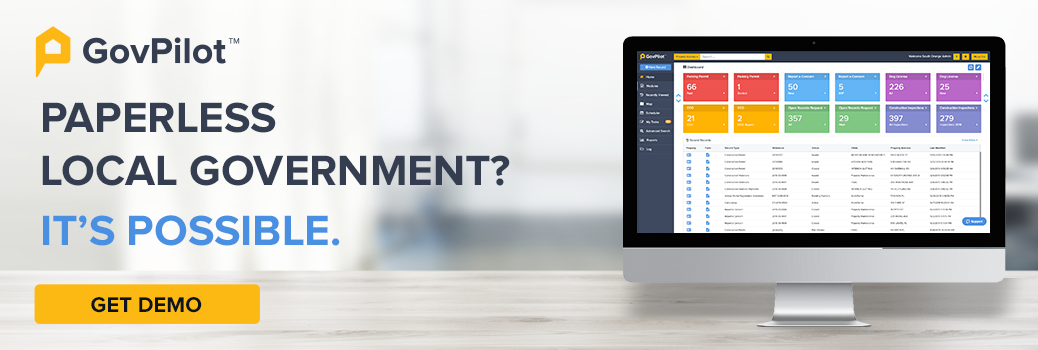Once the pandemic struck, the public and private sectors alike were left with no choice but to work from a remote setting. Everything from work meetings to court hearings began taking place from living rooms and makeshift home offices.
Even as the world continues to open up, that sense of comfort that comes with no commute, more flexible work hours, and the ease of working from home has many uninspired to return to the office. This contingency has undoubtedly played a role in the labor shortage many organizations have struggled to overcome. To make matters worse, the public sector already has a substantially harder time with recruiting than private businesses.
Local governments will need to consider a modern approach to hiring that allows for flexible work days from home. The solution: a hybrid government work culture.
Read on for everything you need to know about the future of government work, and how a few days at home a week will improve recruitment efforts, morale, workflows, and retainment.
Why Is Working Remotely Such a Hot Commodity?
There are many obvious benefits to working from home. Hours are saved every week not commuting. Virtual meetings come with a fresh sense of casualness, as people can wear comfortable, non-professional clothing without shame. The 9 to 5 no longer needs to be set in stone as people can opt to work different hours. Work can get done from home, a coffee shop, or even a remote location.
Studies show that putting these powers in workers’ hands can increase happiness, improve productivity, and reduce turnover, making it a win-win for everyone involved.
In a recent article published in The Hill, Liz Farmer, a fellow at the Rockefeller Institute’s Future of Labor Research Center said, “Governments have long been talking about things like streamlining and putting things online and AI and all that cool tech stuff. But the pandemic really forced their hand. There is a strong sense that governments need to be able to provide services in a way that is what their constituents expect, but with fewer people behind the scenes.”
What Are the Benefits of Offering Remote Work as a Local Government?
With local and state governments struggling to replace exiting workers, government telework offers benefits that many antiquated local government entities likely haven’t considered or thought possible.
Here are some of the top benefits of letting government workers work from a remote location:
- Ease with recruiting: Public sector recruitment is no easy feat. With local governments having less competitive salaries than the private sector, most potential hires are considering working for businesses instead. In offering a fully-remote or hybrid work structure, your local government can increase the odds of finding your ideal candidate.
- Better productivity means quicker turnaround times: A recent study found that 77% of remote workers were more productive working from home. That means that at-home government workers can improve on the slow-moving bureaucratic processes.
- Encouraging employees to embrace digital infrastructure: Even though government technology exists to improve on slow-moving government tasks, government officials that are set in their ways are a major reason that many municipalities haven’t innovated in years. In giving these employees the chance to work from home, they’ll feel more inclined to embrace government management software as a means to spend less time commuting and more time with family.
- Safety for government employees and their families: as the USA experiences unprecedented rates of COVID-19 transmission via the Omicron variant, many Americans are concerned about catching coronavirus at the office. Working from home prevents transmission from occurring in the office, and means that your employees won’t be stuck social distancing and wearing a mask all day.
- Online applications for constituent convenience: Since government officials won’t be in the office, you’ll need to offer digital applications for permits and other government documents. 24/7 access to online applications that can be submitted from anywhere means remote government will make constituents' lives easier too.
What Are the Challenges That Come With Offering Remote Government Jobs?
While the benefits of remote work culture are apparent, there can be challenges that arise with allowing employees to go remote.
Here are some of the challenges that come with allowing government employees to work remotely:
- No digital infrastructure: for many local governments, their current workflows don’t make it possible for government employees to go online. If you’re still filing government documents manually, for example, government officials will be needed at the clerk’s department to store paper documentation.
- Less effective meetings: let’s face it: working from home can be distracting at times. A barking dog or crying toddler in the background of a Zoom call means that the employee at hand likely isn’t paying much attention. For clearer communication and less distractions, in-person meetings are the way to go.
- A lack of work culture: there’s something special about face-to-face interactions with coworkers. Working fully-remote doesn’t necessarily boost camaraderie among employees, and can lead to what feels like a lack of work culture.
The Solution: Hybrid Government Work Culture
To embrace the benefits of working in-person and working remotely, government leadership should consider a best-of-both-worlds scenario: hybrid government work culture.
What is a Hybrid Work Culture?
As the name implies, hybrid work culture is a structure that embraces a combination of working from home and working in-person. The week is generally split between several days of in-person meetings at the office and several days of employees working from home.
Why is Hybrid Work Culture the Best Structure for Local Governments?
Embracing hybrid work means that your employees will get to reap the benefits of both structures.
These benefits include substantially less time commuting every week, in-person interaction to boost camaraderie and work culture, and workflows that allow business continuity in an emergency event that prevents in-person attendance.
How to Best Establish a Hybrid Government Work Culture?
Establishing the processes that will allow for virtual government employment might sound like a challenging task. Fortunately, recent legislation and innovations in govtech mean that government virtualization is not as difficult as it seems.
Here is a list of things you’ll need to do to let government officials work from a remote capacity:
1. Embrace Government Management Software
Government management software is cloud-based infrastructure that allows all government departments to go paperless, work from anywhere, improve workflows, and store documentation securely in the cloud. And, with billions laid out for improving local digital infrastructure in the text of the American Rescue Plan and Infrastructure Investments and Job Acts, you can apply for grants to acquire this technology via federal funding.
To learn more about how federal legislation can assist in going digital, read on:
What Does the American Rescue Plan Mean for Municipal Governments?
What Does the 2021 Infrastructure Bill Mean for Municipal Governments?
2. Acquire Secure Laptops for Government Employees
With government ransomware attacks occurring more regularly, you’ll need to take preventative measures to ensure that hackers can’t steal your precious government data. Provide municipal workers with official government laptops so that they can work remotely and securely without using personal computers.
3. Train Employees On Cybersecurity
Train government employees on the best practices to work from a digital format. By encouraging use of official laptops and emails and educating officials about phishing scams and other common hacking tactics, you can ensure that a remote work structure won’t pose a threat to government cybersecurity.
To learn more about government cybersecurity, read on:
Government Cybersecurity: How to Prevent Ransomware Attacks
How to Train Government Officials on Cybersecurity and Ransomware Attacks
4. Communicate With Government Workers and Constituents
As you roll out your remote work game plan, be sure to keep everyone in the loop. Let government officials know that they can anticipate working from home at least several days a week in the near future.
Constituents will also need to be made aware. Let them know that they can do things like filing permits and licenses, paying parking tickets, or requesting government documents from your government website instead of in-person.
Hybrid Government Work Culture - In Conclusion
Government virtualization of workflows to allow for hybrid work culture is a win for everyone. Government workers can work safely and securely from the comfort of their home and your government leadership can expect better productivity and quicker workflows as a result of going digital. Plus, a few days in the office a week means that you won’t have to worry about the loss of work culture or productive in-person meetings.
To learn more about how government management software can help you to embrace remote government jobs, book a free consultation.
For more helpful resources for your local government, read on
- Government Digital Transformation: What it Means for Local Governments
- How to Build a 15-Minute City
- How Municipalities Can Encourage Local Economic Development
- Best Court Management Software: What to Look For in Judicial Tech
- Building Inspections 101: How Municipalities Can Improve Public Safety
- Should The Public Sector Use the Cloud or In-House Servers
- Municipal Planning: Reclaiming Your City Streets
- What is Disaster Resilient Infrastructure?
- Disaster Preparedness: How Local Governments Build Resilient Communities
- Local Government Wildfire Mitigation & Disaster Plan
- Local Government Flood Mitigation & Disaster Plan
- Local Government Tornado Mitigation & Disaster Plan
- How to Form a Community Emergency Response Team
- Florida House Bills 667 and 1059: Latest Permit and Inspection Laws
- NJ Electronic Construction Permit Law: What it Means for Local Governments
- Pedestrian Zones & Bike Lanes: Improving City's Car Free Zones
Remote Government FAQS
Why Should Local Governments Encourage Remote Working?
Virtual government workflows mean that your employees can work in a remote fashion. That means that you’ll have an easier time finding government talent, will see a boost in productivity from workers, and can fully embrace a modern, digital government infrastructure.
Should Local Governments Be Fully Remote?
While remote work offers clear benefits, meeting in-person a few days a week is still wise. Meeting in the office will allow leadership to keep an eye on employee performance, encourage distraction-free meetings, and to maintain camaraderie across the department work culture.
How Can Local Governments Go Remote & Digital?
Recent federal legislation offers grants for local governments to embrace digital infrastructure. Apply for grants to pay for government software that will automate government tasks and allow employees to work from anywhere. Buy secure laptops for employees so that they’re not working from a personal computer. And, train government workers on the best cybersecurity so that private government data isn’t at risk of being stolen.
Sources
- Remote Work Statistics by Find Stack
- Manage Office Desk Platform by Robin
- Benefits of In-Person Meetings by Carr Workplaces
- New Daily Covid Cases by the Guardian
- Local Governments Struggle to Replace Existing Workers by the Hill







